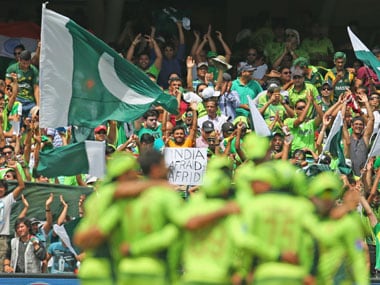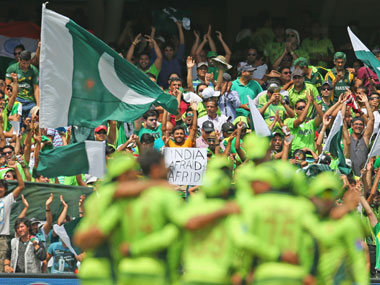There’s always an excuse: match-fixing; umpiring howler; DRS-conspiracy. When Pakistan lose to India they are never just not good enough. When Umar Akmal was controversially given out on a review as Pakistan’s chase of 300 reached a pivotal point, quite suddenly Pakistan had their excuse, they had their fall-guy. The nation’s people could put their Misbah Ul-Haq effigies away and throw together their Richard Kettleborough replicas. But the thing is, Pakistan were losing the match before Akmal was controversially given out, Pakistan were losing the match when Akmal was controversially given out and Pakistan were losing the match after Akmal was controversially given out. Pakistan lost today not because of a controversial umpiring decision. Pakistan lost today because they weren’t good enough. [caption id=“attachment_2100219” align=“alignleft” width=“380”]  While India crafted their innings with care and consideration, Pakistan, albeit in a more pressurised response, struggled to stay calm. Getty Images[/caption] Despite the fact that Pakistan were the owners of the worst win-loss record of the major eight nations in 2014, this match presented them with perhaps their best chance to end their World Cup drought against India. This was an Indian team out of form, with just one win against Afghanistan since they landed in Australia almost three months ago and an India playing in unfamiliar and unfavourable conditions. In the end it was Pakistan’s batting that lost them the match. In pursuit of a challenging, but by no means out-of-reach 300, Pakistan let the pressure of the chase get to them, ignoring the lessons of India’s wonderfully paced first innings, gifting their wickets and chances of victory away as the scoreboard built its own omnipresent pressure. While India crafted their innings with care and consideration, Pakistan, albeit in a more pressurised response, struggled to stay so calm, and in looking to strike boundaries to accelerate the chase, Ahmed Shehzad in particular failed to rotate the strike and Pakistan’s chase slowly stagnated. There was a discernible difference between the likes of Shikhar Dhawan, Rohit Sharma, Virat Kohli and Suresh Raina, naturally inclined limited overs players, and the more rigid innings of Shahzad, Younis Khan and Haris Sohail. India’s run rate didn’t exceed four runs per over until after the twentieth over, but backing their ability and trusting the conditions none of Dhawan, Sharma, Kohli or Raina panicked and the platform was laid and then built upon with commanding assurance. Perhaps the nature of the strategic-preparation for the two teams has something to do with Pakistan’s inability to stay calm. For India, although losing consistently, have at least stuck to a tried and tested game plan. Pakistan, by contrast, have continually adjusted their own strategy to such an extent that Younis was thrust up to open for only the third time in his career and first time in six years. In a format defined by roles — when Pakistan eternally reassign them it is of little surprise that the players struggle to then fulfil them. Pakistan’s chase was fraught, panicked and muddled and never once got going. In amongst the rubble of defeat there are positives for Pakistan. They bowled excellently, particularly at the close of the innings and against some high-class batting. Wahab Riaz was superb and deserved better than his figures of 1-49 while Sohail Khan took 5-55. Misbah also, yet again, batted with poise and dignity as Pakistan’s chase crumbled. This defeat will however leave scars deeper than merely the setback of an opening match defeat. Pakistan have now played India six times in the World Cup and lost all six. In a tournament they have little hope of winning, this match was, to a nation defined by their struggle with their arch-rivals, as close to a final as it was going to get. But rather than burning effigies of Misbah, effigies of Younis or effigies of Kettleborough, Pakistan fans should burn effigies of their excuses; because they are no longer valid. Pakistan lost to India because they weren’t as good as India, not in skill nor execution. The sooner they accept that, the better.
While India crafted their innings with care and consideration, Pakistan, albeit in a more pressurised response, struggled to stay calm.
Advertisement
End of Article


)

)
)
)
)
)
)
)
)



